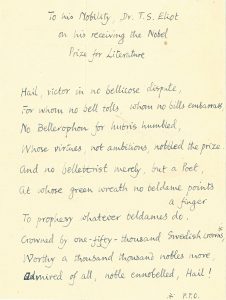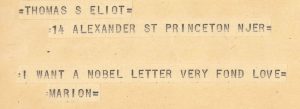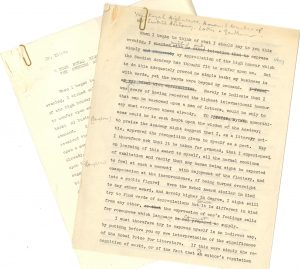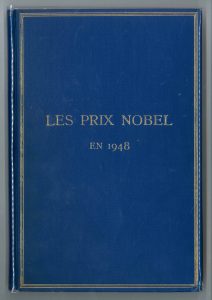In January 1948, T. S. Eliot was awarded the Order of Merit; in a letter congratulating him, W. H. Auden remarked ‘Now the next thing shall be the Nobel Prize’. Auden’s foretelling came true some months later when Eliot was awarded the Nobel Prize in Literature on 4th November 1948.
When the prize was announced, Eliot was in the middle of a two month placement at the Institute for Advanced Study at Princeton University. He had been invited by the Director, Frank Aydelotte, to come ‘for a period of two or three months with no duties except to go on quietly with your own work and to engage in such discussion with Members of our group here as may seem interesting and profitable to you.’ This quiet work and discussion was somewhat interrupted by the Nobel announcement, with Eliot gaining a different level of fame to that which he had already enjoyed. He was flooded with telegrams and letters of congratulation from friends, family, colleagues and respectful strangers from afar. ‘The Man In White Spats’ [John Hayward], George Hoellering (director of the film of Murder in the Cathedral), Aldous and Maria Huxley, E. M. Forster, Osbert and Edith Sitwell, students and teachers in the English Department at the University of Dacca in East Bengal, Zulfaqar Bokhari at Radio Pakistan, Italian academic Renato Poggioli and Frank Taylor of Metro Goldwyn Mayer Studios were among those who sent messages of congratulation. Geoffrey Faber wrote ‘New motto for Faber and Faber is Nobelesse Oblige’ and American publisher Robert Giroux’s telegram directed Eliot to lines eighty and one hundred six in Canto four of Dante’s Inferno – ‘Onorate l’ altissimo poeta / Venimmo al piè d’ un nobile castello’ – ‘Honor the great poet / We came to the foot of a noble castle.’
Among the more personal responses is a handwritten congratulatory poem by writer and poet Anne Ridler, Eliot’s assistant at Faber & Faber between 1935 and 1940. Addressed ‘To his Nobility, Dr T. S. Eliot on his receiving the Nobel for Literature’, the poem begins:
‘Hail, victor in no bellicose dispute,
For whom no bell tolls, whom no bills embarrass,
No Bellerophon for hubris humbled,
Whose virtues, not ambitions, nobbled the prize.’

On hearing the news, Eliot’s sister Marion sent him a telegram with a request: ‘I want a Nobel letter very fond love. Marion.’ A few days after returning from the Nobel festivities in Stockholm, Eliot dutifully wrote Marion a long letter describing the events in detail, including his journey from New York via London, the award ceremony, banquet and other duties he was engaged in while there. The full text of the letter (held by the Houghton Library, Harvard) was published earlier this year by the Observer and can be read here.

Eliot received the Nobel Prize in Literature at a ceremony in Stockholm on 10th December 1948. Eliot was one of four Nobel laureates: Patrick Maynard Stuart Blackett, awarded the Nobel Prize in Physics, Arne Wilhelm Kaurin Tiselius, awarded the Nobel Prize in Chemistry, and Paul Hermann Müller, awarded the Nobel Prize in Physiology or Medicine. The Nobel ceremony at the Stockholm Concert Hall was followed by a banquet at the City Hall where the four laureates each gave a speech. Eliot was asked to speak first: ‘Fortunately, I not only had my speech written out, but had cut it to the right length – it will be published in the proceedings of the Nobel Foundation: it seemed to suit the occasion.’

Eliot’s original draft of the speech includes the usual revisions, but he has also added ‘(laughter)’ alongside two remarks at the beginning which he hoped would be received in good humour. However his speech was received, his letter to Marion reveals that he thought himself the best speaker of the evening – ‘After that I took the same course back, and listened peacefully to the other speakers – and to tell the truth, none of them seemed to me to do as well as I did…’.

The Nobel proceedings, including Eliot’s speech, were published in Les Prix Nobel en 1948. The commemorative book includes photographs and biographies of each laureate and transcripts of the speeches given about each Nobel Laureate: Eliot’s was given by Anders Österling, a Swedish poet and writer and Permanent Secretary of the Swedish Academy. In his speech, Österling spoke of Eliot’s capacity ‘to cut into the consciousness of our generation with the sharpness of a diamond’, and his ability for ‘stimulating a reconsideration of pressing questions… with the gift of a master for finding the apt wording, both in the language of poetry and in the defence of ideas in essay form’.

The full text of Eliot’s banquet speech can be found here.
For more on Anne Ridler see here.


